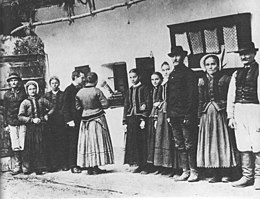
Back Musica folk AN موسيقى شعبية Arabic مزيكا فلكلوريه ARZ লোক-সংগীত Assamese Folk AST Xalq musiqisi Azerbaijani Kantang banwaan BCL Фолк-музыка Byelorussian Фолклорна музика Bulgarian লোকসঙ্গীত Bengali/Bangla
| Folk music | |
|---|---|
 Béla Bartók recording peasant singers in Zobordarázs, Kingdom of Hungary, (now Nitra, Slovakia) 1907 | |
| Traditions | List of folk music traditions |
| Musicians | List of folk musicians |
| Instruments | Folk instruments |
| Other topics | |
Folk music is a music genre that includes traditional folk music and the contemporary genre that evolved from the former during the 20th-century folk revival. Some types of folk music may be called world music. Traditional folk music has been defined in several ways: as music transmitted orally, music with unknown composers, music that is played on traditional instruments, music about cultural or national identity, music that changes between generations (folk process), music associated with a people's folklore, or music performed by custom over a long period of time. It has been contrasted with commercial and classical styles. The term originated in the 19th century, but folk music extends beyond that.
Starting in the mid-20th century, a new form of popular folk music evolved from traditional folk music. This process and period is called the (second) folk revival and reached a zenith in the 1960s. This form of music is sometimes called contemporary folk music or folk revival music to distinguish it from earlier folk forms.[1] Smaller, similar revivals have occurred elsewhere in the world at other times, but the term folk music has typically not been applied to the new music created during those revivals. This type of folk music also includes fusion genres such as folk rock, folk metal, and others. While contemporary folk music is a genre generally distinct from traditional folk music, in U.S. English it shares the same name, and it often shares the same performers and venues as traditional folk music.
- ^ Ruehl, Kim. "Folk Music". About.com definition. Archived from the original on November 22, 2016. Retrieved August 18, 2011.